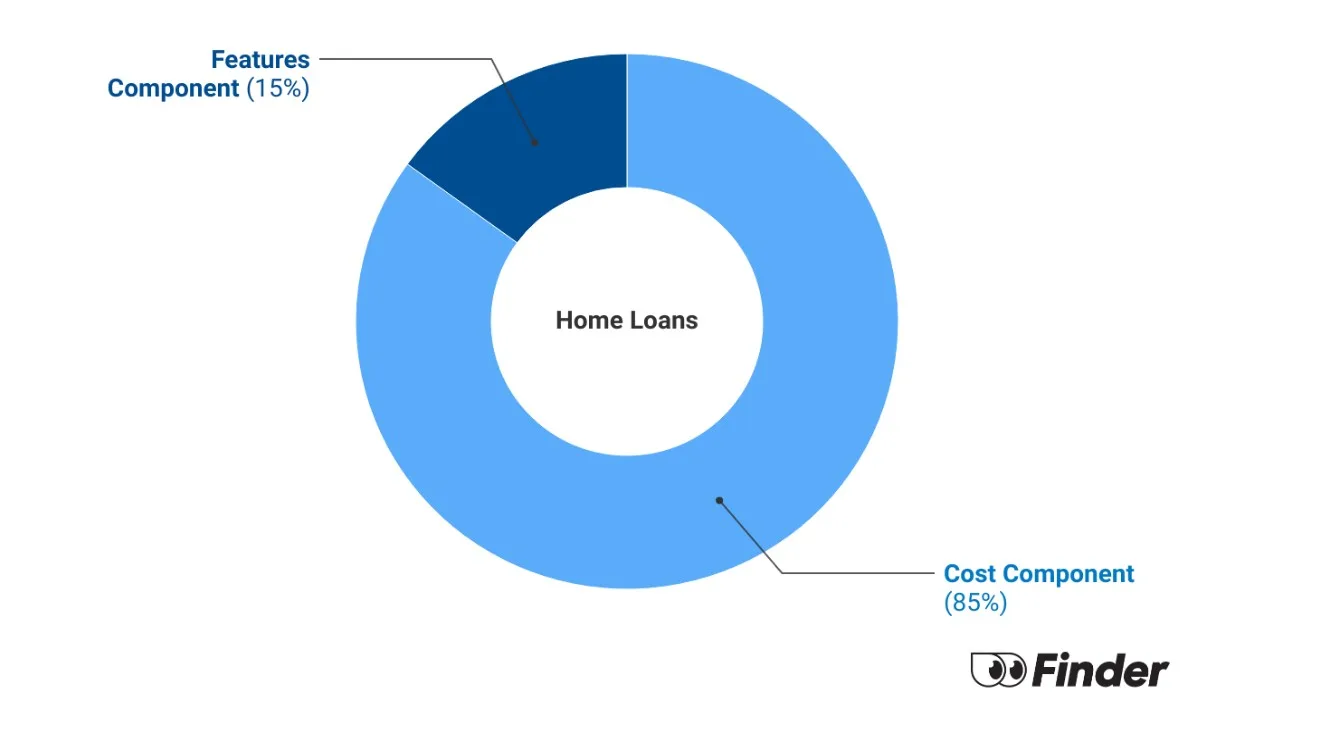Compare other products
We currently don't have that product, but here are others to consider:
How we picked theseWhat is a home loan?
A home loan is the money you borrow to buy a property. You save a deposit first, which is usually 5-20% of the property's value and then you borrow the rest. This is your loan amount or your loan principal.
Your lender charges you interest based on the loan principal amount and your home loan's interest rate. The higher the home loan interest rate, the higher your repayments will be.
How do I compare home loan interest rates?
A good home loan comparison starts with a careful look at interest rates. The lower the rate, the lower your repayments will be.
Let's compare 2 otherwise identical home loans with slightly different interest rates.*
| Interest rate | 6.42% | 5.09% |
|---|---|---|
| Loan amount | $693,802 | $693,802 |
| Loan term | 30 years | 30 years |
| Monthly repayment | $4,349 | $3,763 |
| Monthly saving | N/A | $586 |
| Annual saving | N/A | $7,032 |
As you can see, with the lower interest rate, you save $586 a month – or $7,032 a year.
*We're using the average owner-occupier home loan size from the ABS, the average variable rate loan in Finder's database of the full market and the lowest variable rate available for refinancers.
Finder's lowest monthly home loan rate tracker
Home loan comparison is hard if you have no clue what a low rate looks like. That's why we analyse all the loans in our database to find the most competitive rates each month.
The graph below shows the market's lowest* fixed and variable rates for home buyers and investors.
*Rates must have LVRs of 80% or higher and exclude unique or unusual loan products that aren't suitable for most borrowers.
How do I compare home loan fees and features?
The interest rate is the most important factor you'll want to compare to determine how much your loan will cost you. But fees and features are also really important.
Comparing home loan fees
Examples of home loan fees include the following:
- Application fees. This one-off fee can run as high as $600.
- Ongoing fees. Some loans come with a monthly or annual fee, usually worth around $120 a year or $10 a month. Package loans have an annual fee of up to $500.
- Valuation fees. This covers your lender's cost to have your property professionally valued. It can cost several hundred dollars.
- Discharge fees. A discharge fee is only charged when you end a home loan, either by refinancing or paying off the loan.
Comparing home loan features
The following are the most common and useful home loan features:
- Offset account. A 100% offset account is a bank account attached to your home loan. Functioning like any other bank account, any money held in the account reduces the amount of the loan you're charged interest on. It's not available with every loan, such as fixed rate and basic loans. Many offset loans attract a monthly or annual fee, or a higher rate.
- Extra repayments. If your loan allows you to make extra repayments, you can pay it off faster. This will save you in interest charges. These days, most variable rate loans allow extra repayments, although some fixed rate loans don't.
- Redraw facility. A redraw facility is common on home loans that allow extra repayments. A redraw allows you to withdraw extra repayments from your loan and spend them if you need to. Some lenders charge a redraw fee or restrict how much money you can access.
- Split facility. Some loans allow you to split your mortgage into both fixed and variable portions. This lets you create a flexible loan that offers the benefits of both a fixed and variable rate.
Look at a home loan's comparison rate
The comparison rate is designed to help borrowers understand the true cost of a loan by adding in fee costs over time. But it's only a hypothetical calculation based on a specific loan amount and term. It's not that useful because every borrower's situation is unique.
You're better off working out how much your loan will cost you every month and factoring in the cost of fees on top of that.

"I've switched my home loan 6 times in the last 10 years. Each year, I'll search and compare for a better deal. My thinking is, why spend more on my home loan than I need to? Whether you're getting your first loan or your fifth, it's not as hard as you might think. Be clear on the features you want (like offset or redraw), and look at both the fees and the interest rate to work out the best deal for you."
I've found a good home loan, what next?
Home loan comparison is just one step. Once you've found a suitable home loan it's time to apply.
- Get your information ready. Your lender needs to see some ID, check your credit score, examine recent pay slips (or view your transaction history online). They'll need your property address too.
- Complete the mortgage application. Some lenders make this a fast, easy online process. Some may still require some actual paperwork and take a week or more to process your application.
- Wait for approval. The lender may have some follow-up questions. You may need to supply more documents or information.
- Get ready for settlement today. Once your loan's approved you wait for settlement day. This is when the money changes hands and you get the keys (if you're refinancing there's no keys, but there's still settlement between your old lender and your new one).
Home loan pre-approval
Alternatively, let a broker help
At Finder we're big believers in DIY comparison. You can get a better rate than a mortgage broker with a little search.
But brokers don't just help you compare home loans, they also guide you through the application process at every step. Brokers also have a good sense of specific lenders' eligibility criteria, which increases your chances of getting a loan approved.
Home loan guides and resources

Refinancing & offers

Loan comparisons
Our Home Loan Awards
Finder's home loans awards celebrate stand-out home loan products across 15 different categories. Our experts analysed 12 months' worth of interest rate and fee data to find the best solutions for any borrower type. Our team of experts reviewed over 7,490 home loan rates from across 100+ lenders to select our Finder Home Loans Awards winners for 2026.

More home loan questions answered
Thousands of Australians compare home loans with Finder every month
4.69 average rating from 805 reviews






What is the Finder Score?
Finder Score is an easy, data-driven way to judge home loans at a glance. Our insights team compares more than 7,000 home loans across 120+ lenders to give each product a score out of 10 comparative to other products of its type.
This means we compare home loan products against others of its type. For example, variable rate home loans against variable rate home loans, and investor home loans against investor home loans. In total, there are 12 different product groupings.
We filter the loans in our database for each category so that we're only looking at loans that work for the borrower type. The final Finder Score takes into account the home loan's interest rate, its major fees and the presence of useful features like offset accounts.
The higher the score, the lower the cost compared to other products of its type.
What the Finder Score mean for home loans
- 9+ Excellent - These are the home loans which offer the lowest costs coupled with plenty of features, giving the best overall value.
- 7+ Great - These home loans may have slightly higher interest rates, maybe a fee or two, or fewer features, but overall, a competitive offering.
- 5+ Satisfactory - Usually these home loans would offer above average rates and may still include some competitive features, but they're not the best value for the overall cost.
- Less than 5 - Basic - These home loans have higher costs and/or fewer features than other home loans on the market.
Sources
Ask a question
12 Responses
Read more on Home Loans
-
Home loan cashback offers
Home loan cashback deals can help you refinance to a cheaper interest rate and get a lump sum cash payment. Compare the latest deals and check your eligibility today.
-
A guide for first home buyers
Use our complete first home buyer guide to make your first home purchase as stress-free as possible.
-
Current home loan interest rates in Australia
We compile the average home loan interest rates in the market and update them monthly.
-
South West Slopes Bank home loans
A community credit union operating in the south west country area of NSW, helping you find the right home loan.
-
Greater Bank home loans
Check out home loans from Greater Bank and apply today.
-
ING home loans
Thinking about getting a home loan from ING? Compare rates and learn more about this lender.
-
loans.com.au home loans
loans.com.au is one of Australia's leading online only lenders with a range of products that have great features and low costs.
-
Community First Bank home loans
Community First Bank is a credit union that offers home loans in addition to other financial products.
-
Cheap Home Loans Australia
Find the cheapest home loan rates and learn how to decide which one best fits your needs and will save you the most money.
-
Best Home Loan Rates Australia
Learn how to compare rates to find the best home loan and start saving money on your mortgage today.






i need help.
Hi there,
I’m not sure what kind of help you need? You might be eligible for a no-interest loan through Good Shepherd, worth up to $3,000. Otherwise, you can search our site for other opportunities to access lending.
Hope this helps!
I have a current mortgage with Bendigo Bank on fixed interest rate of 2.090% which expires in July.
I want to know my options when it expires.
Small mortgage which is due to be paid off in 2029.
None of your options seem to include this issue.
Can I speak with someone?
Hi Susan,
You have a couple of options. You could:
– Stick with Bendigo Bank and either roll over onto a variable rate loan option in July, or choose another fixed rate home loan.
– Refinance to a different bank, and choose either a fixed or variable rate.
Your eligibility to refinance depends on a number of things, including your age, income and loan amount. As a first step, it might be worth contacting your bank so they can let you know what their current rates and offers are, so you have an idea of what your repayments will be from July onwards. You can then compare this to other options in the mortgage market to see if you can get a better deal elsewhere.
Hope this helps!
Useless tool – no way to select weekly payments.
Hi Chris,
We appreciate your feedback.
Our tables contain quite a bit of information in them. In the interests of brevity, we currently allow you to compare home loans by monthly payments. If you’d like to know the estimated weekly payments, you can divide these estimates by 4.3. For instance, if the monthly estimate was $3,000, once you divide it by 4.3, the weekly amount would be $697.67.
Hope this helps, and thanks again for the feedback – we’ll explore whether this functionality can be added.
Many thanks
Sarah
I’d like speak to someone about refinancing a please?
Hi Michael,
If you already have a preferred lender, you can visit their website to submit an application and/or request to speak with their home finance representative.
Alternatively, you can speak with a professional mortgage broker to get personalised advice. You can call one of the mortgage brokers found on our page to schedule an appointment or search for a mortgage broker in your area on Google.
I hope this helps!
Richard
I am an Australian citizen returning to Australia after several years abroad. I will be entering into employment with the Australian branch of my existing employer with a new employment contract (but without a probation period). Can you advise limits to home loan borrowing upon arrival. e.g. is their a qualifying period for work/residence in Australia for lenders?
Hi JDM,
Thanks for your question!
All Australian citizens are eligible to apply for a home loan. This is one of the basic requirements. Others include age, income, and other unique requirements of the lender.
As a friendly reminder, carefully review the eligibility criteria of the loan before applying to increase your chances of approval. Read up on the terms and conditions and product disclosure statement and contact the bank should you need any clarifications about the policy.
A mortgage broker is the best person to reach out to see your options for home loans. They can give you a multitude of options according to your situation. In the meantime, to give you an estimate of your monthly repayments, you can use our home loan eligibility calculator.
Hope this helped. Feel free to reach back out for further assistance.
Cheers,
Nikki